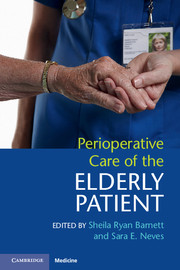Book contents
- Perioperative Care of the Elderly Patient
- Perioperative Care of the Elderly Patient
- Copyright page
- Dedication
- Contents
- Contributors
- Preface
- Section 1 Background
- Section 2 General Health and Illness
- Section 3 Intraoperative Considerations
- 9 The Surgeon's Perspective
- 10 Geriatric Cardiac Procedures
- 11 The Aging Valve
- 12 Thoracic Surgery in the Elderly
- 13 Geriatric Trauma: Principles and Anesthetic Considerations
- 14 Major Surgery in the Elderly
- 15 Elective Orthopedic Surgery in the Geriatric Patient
- 16 Regional and Neuraxial Anesthesia in the Geriatric Population
- 17 Anesthesia for Urologic and Gynecologic Surgery in the Elderly
- 18 Cataract Surgery in the Elderly
- Section 4 Postoperative Issues
- Index
- References
9 - The Surgeon's Perspective
from Section 3 - Intraoperative Considerations
Published online by Cambridge University Press: 06 January 2018
- Perioperative Care of the Elderly Patient
- Perioperative Care of the Elderly Patient
- Copyright page
- Dedication
- Contents
- Contributors
- Preface
- Section 1 Background
- Section 2 General Health and Illness
- Section 3 Intraoperative Considerations
- 9 The Surgeon's Perspective
- 10 Geriatric Cardiac Procedures
- 11 The Aging Valve
- 12 Thoracic Surgery in the Elderly
- 13 Geriatric Trauma: Principles and Anesthetic Considerations
- 14 Major Surgery in the Elderly
- 15 Elective Orthopedic Surgery in the Geriatric Patient
- 16 Regional and Neuraxial Anesthesia in the Geriatric Population
- 17 Anesthesia for Urologic and Gynecologic Surgery in the Elderly
- 18 Cataract Surgery in the Elderly
- Section 4 Postoperative Issues
- Index
- References
- Type
- Chapter
- Information
- Perioperative Care of the Elderly Patient , pp. 99 - 107Publisher: Cambridge University PressPrint publication year: 2018

